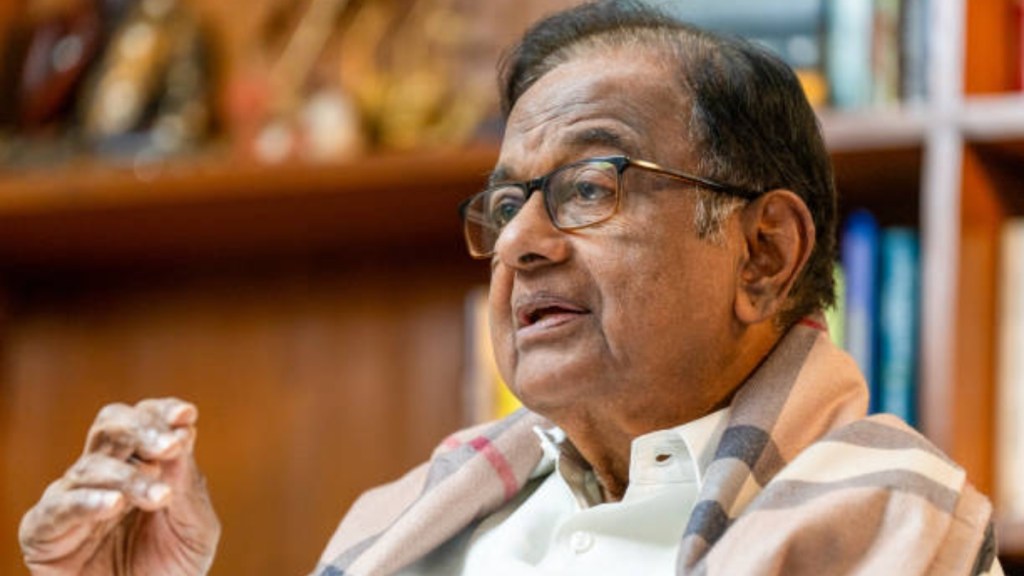Congress leader P. Chidambaram has urged the government to clarify India’s stance on US President Donald Trump’s tariff war threats, criticising the lack of discussion in Parliament or consultation with Opposition parties on the issue.
He emphasised the need to find common ground with other nations sharing similar concerns about Mr. Trump’s approach. He warned that if Mr. Trump selectively imposes tariffs on individual countries, the affected nations might be left to fend for themselves.
In an interview with NDTV, Mr. Chidambaram stated that if the Indian government perceives America’s stance as inconsistent—taking “one step forward and two steps backwards”—it must formulate a counter-strategy.
“I mean, it can’t be in uncertainty. Of course, Americans are uncertain, let’s assume so. But you must have alternative scenarios. What if they take one step forward? What is our response? What if they take two steps backward? What is our response? And that response need not be made public to the whole world, but at least there must be a statement in Parliament, or there must be a consultation with opposition parties. We are completely in the dark,” Mr. Chidambaram, who served as finance minister under the UPA government, told NDTV.
“In fact, my information is, most ministers are in the dark. Who is involved in making this reactive policy to America’s uncertain policy? I don’t know. Nobody seems to know,” he added.
Mr. Trump’s decision to impose a 25 percent tariff on all automobile imports has created uncertainty over India’s $7 billion exports to the US , raising concerns about squeezed profit margins. The new tariffs, set to take effect on April 2, would apply to all automobile and car part imports into the US
While India is not a major car exporter to the US , Tata Motors’ luxury car brand Jaguar Land Rover (JLR) has a significant presence in the American market. However, the biggest impact will be on Indian auto component firms, which supply a substantial number of parts to the US
Around 20 pe rcent of India’s auto component sector’s revenue comes from exports, with 27 percent of that going to the US market alone.
“I think the government is making sort of impromptu, unilateral, knee-jerk decisions. For example, in the Budget speech, they got rid of the 2 percent tax. The day before yesterday, the finance minister announced that the 6 percent digital service tax, popularly known as the Google tax, will go. Now, what more are they going to concede to Mr. Trump?” Mr. Chidambaram said.
“If you don’t wish to have a public discussion in Parliament, then you should at least invite the principal opposition parties which are represented in Parliament and take leaders into confidence of what alternative scenarios are being worked out,” he added.
Defending his claim that most ministers are unaware of the government’s approach, Mr. Chidambaram said, “I think at the moment, only the external affairs minister and perhaps the commerce minister who went on a delegation to the US are privy to what is going on. I don’t think other ministers know. I’m sure the agriculture minister does not know. I’m sure the industries minister does not know. But they are making concessions? I don’t know. Are you making concessions on agriculture? Are you making concessions on industrial goods? Are you making concessions on intellectual property? I don’t think anybody knows.”
He stressed that India must prioritize its own interests while recognizing that many countries share the view that unilateral tariffs imposed by the US are unacceptable.
“There are WTO rules; there are multilateral and bilateral trade agreements; there are international laws and conventions. So if you want to rewrite the tariffs of several countries, you must hold a discussion. This is what Prime Minister Mark Carney of Canada is doing. He has taken his Parliament into confidence, at least the leaders into confidence. And he says we will coordinate with the European countries and respond to Mr. Trump’s unilateral tariffs,” Mr. Chidambaram said.
“Now, I’m sure the oil-producing countries are also coordinating among themselves. We are a major agricultural exporter. We are a major textile exporter. We also export a lot of industrial goods. So we must band together with countries which are in the world market for agricultural exports, textile exports, and industrial goods exports, and evolve a common approach. You see, if he [Mr. Trump] picks one country at a time, and imposes tariffs, it will ruin the economy of that country.
“Suppose he picks India, and he leaves other countries out. Suppose President Trump picks India and says, ‘these are the tariffs from goods exported from India’, we’ll be ruined. In a matter of three to six months, our economy will be ruined.
“I’m afraid Mr. Trump is not going to group all the countries together and impose universal tariffs. He’s giving a number for each country, what they have calculated, I’m told, calculated as the average weighted trade tariff. And he’s going to pick one by one and force them to surrender. If he does that, and if he picks India, other countries will say, ‘we have not been picked up’. So unless you take action to forestall such picking out countries, and imposing tariffs, you’ll be left high and dry after the first attack,” Mr. Chidambaram said.


